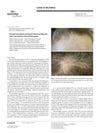Hair proteins in preschool children and their mothers could indicate developmental changes and health status.
 November 2023 in “Dermatology and Therapy”
November 2023 in “Dermatology and Therapy” Baricitinib treatment helps regrow eyebrow, eyelash, and scalp hair in severe alopecia areata, improving patients' emotional well-being and quality of life.
 September 2023 in “British Journal of Dermatology”
September 2023 in “British Journal of Dermatology” Hair regrowth from severe alopecia areata treatment with baricitinib can vary, with faster results in those with shorter hair loss duration.

Botulinum toxin type A significantly reduces scalp psoriasis severity compared to placebo.

The man's scalp tightness after hair surgery affects his life and work, and it's unclear if it's due to the surgery or a mental health issue.

Accurate diagnosis of cicatricial alopecias requires thorough scalp examination and multiple biopsy techniques.
 July 1997 in “Journal of Cutaneous Medicine and Surgery”
July 1997 in “Journal of Cutaneous Medicine and Surgery” Finasteride significantly increases scalp hair and prevents hair loss in young and middle-aged men.

Thicker scalp fat may link hair loss with metabolic syndrome.
December 2022 in “Frontiers in Microbiology” The scalp microbiome is more diverse and may be more important in hair loss than the gut microbiome.
 73 citations,
June 2003 in “Journal of the American Academy of Dermatology”
73 citations,
June 2003 in “Journal of the American Academy of Dermatology” Dermatologists need to understand African American hair-care practices to better treat their hair and scalp disorders.
 26 citations,
December 2015 in “International Journal of Dermatology”
26 citations,
December 2015 in “International Journal of Dermatology” Trichodynia is a painful scalp condition linked to hair loss and inflammation, often with anxiety, affecting more women and needing better treatment options.
 13 citations,
September 2017 in “Skin appendage disorders”
13 citations,
September 2017 in “Skin appendage disorders” Some women with Frontal Fibrosing Alopecia also have Lichen Planopilaris, which can lead to more symptoms and affect hair outside the scalp.
 8 citations,
January 2007 in “Mycoses”
8 citations,
January 2007 in “Mycoses” A man's scalp infection, mistaken for bacterial, was actually a rare fungal infection treated successfully with antifungal medication.
 November 2024 in “Medicina”
November 2024 in “Medicina” Recognizing scalp symptoms in PRP is crucial for proper diagnosis and treatment.
 June 2024 in “JEADV Clinical Practice”
June 2024 in “JEADV Clinical Practice” Severe alopecia areata patients have a low chance of spontaneous hair regrowth.

Baricitinib therapy helped many patients with severe alopecia regrow hair after 52 weeks.
 June 2023 in “Pediatric investigation”
June 2023 in “Pediatric investigation” A boy's scalp infection, usually found on the body, was effectively treated with antifungal cream.
 April 2016 in “Journal of The American Academy of Dermatology”
April 2016 in “Journal of The American Academy of Dermatology” Certain scalp tissue features can predict how well alopecia areata responds to steroid injections.
 January 2011 in “Healthcare Informatics Research”
January 2011 in “Healthcare Informatics Research” Hair loss is significantly linked to symptoms like dry hair, scalp issues, addiction to tobacco or coffee, anxiety, and digestive problems.
 September 1998 in “Journal of The European Academy of Dermatology and Venereology”
September 1998 in “Journal of The European Academy of Dermatology and Venereology” Auto-portraits help evaluate scalp hair.
 5 citations,
October 1984 in “The BMJ”
5 citations,
October 1984 in “The BMJ” Up to 50% of scalp hair can be lost before it appears thin, and treatment is only needed for hair loss caused by diseases or deficiencies.
 4 citations,
January 2021 in “Skin appendage disorders”
4 citations,
January 2021 in “Skin appendage disorders” Trichodynia is a painful scalp condition not directly linked to the amount or type of hair loss and may involve psychological factors, with treatments showing mixed results.
 November 2024 in “Journal of the European Academy of Dermatology and Venereology”
November 2024 in “Journal of the European Academy of Dermatology and Venereology” Long-term baricitinib treatment can lead to significant scalp hair regrowth in patients initially showing only eyebrow or eyelash regrowth.
 October 2022 in “Gadua Journal of Pure and Allied Science”
October 2022 in “Gadua Journal of Pure and Allied Science” Terbinafine is the most effective treatment for tinea capitis, a scalp infection often confused with other conditions.
 July 2017 in “British Journal of Dermatology”
July 2017 in “British Journal of Dermatology” The document concludes that scalp conditions have various causes and can present in many different ways.
 March 2014 in “Medicina cutánea ibero-latino-americana”
March 2014 in “Medicina cutánea ibero-latino-americana” Melatonin applied to the scalp helps increase hair density in people with early hair loss.

Melatonin applied to the scalp helps treat early-stage hair loss in men and women.
 157 citations,
April 1994 in “Clinical endocrinology”
157 citations,
April 1994 in “Clinical endocrinology” Androgens can cause hair growth in some areas and hair loss on the scalp.
 2 citations,
October 2020 in “International Journal of Dermatology”
2 citations,
October 2020 in “International Journal of Dermatology” Lichen planopilaris in men often involves scalp redness and itching, with some also having hair loss, mucosal lichen planus, or thyroid disease, and treatment improved symptoms in nearly half of the cases.

Botulinum toxin-A injections in the scalp can reduce hair loss and promote new hair growth in men with certain types of baldness.



























